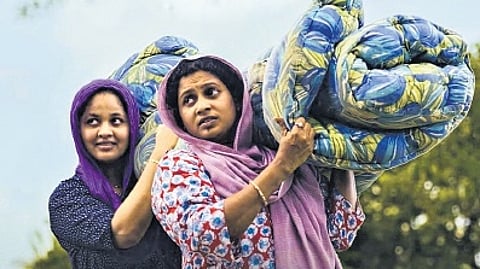

Fasil Muhammed, director of Feminichi Fathima, a satirical exploration of patriarchy and gender dynamics within a conservative Muslim household, has been garnering rave responses from audiences at the International Film Festival of Kerala (IFFK), where the film is part of the international competition section.
Having been a short film director and spot editor in the film industry, Fasil has indeed made a sensational debut as a feature filmmaker. Here, he shares his thoughts in a quick chat with TNIE:
What inspired you to create a film like Feminichi Fathima?
There has been a noticeable change among Muslim women. Until recently, many constraints held them back, but now they are starting to break free from old traditions and step into their own. They are proving their talents and showing courage, whether it’s on social media or in other spaces.
I have been observing these changes and reflecting on them for a long time. I wanted to create something that highlights this shift. The idea for Fathima’s story came from a small moment during a visit to a relative’s house. One morning, I heard my sister scolding her son for wetting the bed. She said, “I tried so hard to stop him from wetting the bed, and now the smell won’t go away.” That line stuck with me, and it became the starting point for Fathima’s story.
The title Feminichi Fathima is striking. Did you face any concerns about using the term ‘Feminichi’, which often carries a negative connotation in contemporary discourse?
The title was decided from the very beginning, and I view ‘Feminichi’ as a very positive term. When a woman is called a ‘Feminichi,’ it means she is growing and evolving. The term reflects the growth.
Usually, people use ‘Feminichi’ as a joke or to mock someone. But for a woman, there should be no shame in it — only pride. The problem lies within society.
If there’s any negativity attached to it, that will change after people see my film. I believe the term ‘Feminichi’ will be viewed positively from then on.
‘There are still many Fathimas in our society’
How did you ensure the protagonist’s evolution felt organic and relatable to the audience?
I’m not saying anything beyond imagination, nor is it something on a grand canvas. It’s simply about what I observe when I see a Muslim woman at home — her thoughts, her conversations. That’s the core of the movie. I connected the story with my own home and the Muslim women I have seen. It’s a very local story. It feels relatable because it was filmed in a way that’s close to home, with familiar faces and environments.
Satire is tricky, especially when addressing sensitive topics like patriarchy and religious conservatism. How did you balance humour and social commentary?
I shot the film in Ponnani, my hometown. My first audience was the people from there who came to see the shooting. In a way, all of them are Fathimas. As they listened to the dialogues, they were enjoying, laughing, and relating to them, even recognising their own experiences. That gave me the confidence that the film wouldn’t lead to controversy or be misinterpreted. I included both a group that resists updates in religion and another that is more progressive. The goal was to show that updates must happen in line with the times. It was challenging, but since it dealt with everyday experiences in a way that connected with people, I was confident that everyone would accept it in that spirit.
What do you hope audiences will take away from Feminichi Fathima?
For a film like this, with a relatively new cast, we didn’t expect the same kind of acceptance as a typical commercial movie. Our main thought was to figure out how to bring the film to the audience in the best way. The obvious choice was IFFK. And now it wasn’t just selected for screening but also made it into the international competition, which makes me really happy.
There are still many Fathimas in our society. I hope this film raises some understanding for them. I also believe it will lead to meaningful conversations and help bring about positive changes in how people think. I’m really happy with the response at IFFK, and I see it as the result of all the hard work I have put into the film. I hope it reaches even more people soon.